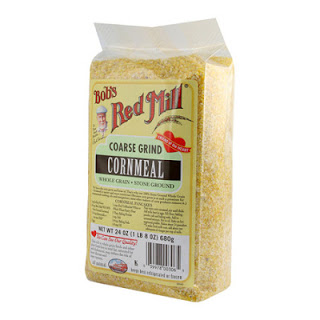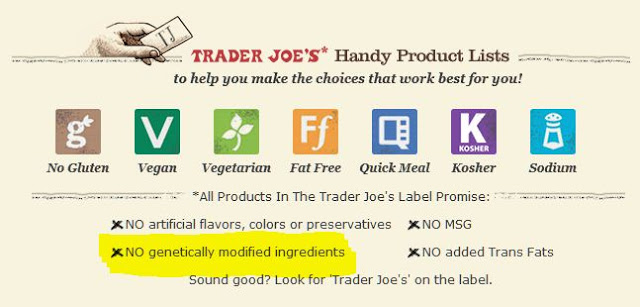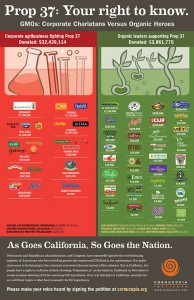A Hand-Holding Consumer Guide to GMOs
 |
| Original article by Analiese Paik on Fairfield Green Food Guide |
Note: Technically (for those who will take me to task on this), we’re talking about GE, or genetically-engineered foods here, not genetically modified, although GMO is the terminology that’s most commonly being used (GE is a subset of GMO). These are foods that are made from crops produced from patented GE seeds whose DNA has been altered through the introduction of foreign DNA (transgenic) by biotech giants Monsanto, Syngenta, Bayer, DuPont and Dow, not modified through cross-pollination. GE seeds are sold to farmers under license and have been developed to resist the application or herbicides or produce their own pesticides (or both). As current GE crops grow resistant to herbicides and plant pests, next generation GE crops are being developed, including a corn that will also withstand the application of 2, 4-D, the main ingredient in Agent Orange.
 |
| Look for processed foods with this seal to avoid eating GMOs. Fact: GMOs have not been tested for safety in humans, animals or the environment. |
Whole Foods
Most soybeans (sold fresh as edamame or dried as soybeans), some fresh sweet corn, half of all Hawaiian papayas, and a small amount of zucchini and yellow crookneck squash are GMO. Salmon and apples are on the way. Most cotton and canola is GMO, but we only eat ingredients made from their seeds, principally oils (see next two sections). GM sugar beets are processed into sugar (see next two sections). Most GM corn is used as animal feed and some is processed into meal and flour that’s used to make chips and other foods (see below and next two sections).
Wheat and rice are not genetically engineered, although a lot of people think they are (there are test fields mind you). Rather, they have been cross-bred (genetically modified) to barely resemble the ancient grains they descended from (and so has non-GMO sweet corn for that matter), and many people claim to react badly to them. Buy ancient grains like kamut, farro, spelt, emmer, and einkorn instead if you want to avoid modern durum wheat.
There is no way of knowing whether a whole food item is GMO since labeling isn’t mandatory, so we’ll have to engage in some reverse logic to figure it out. If the item is labeled USDA Organic and/or Non-GMO Project Verified, then it’s non-GMO. Advice: Buy your sweet corn, zucchini, and crookneck squash in season from an organic farmer and buy only organic soybeans and organic or non-Hawaiian papaya to avoid GMOs.
This is a short list and relatively easy to master, but we’re not done. Unfortunately most animal products come from livestock raised on GMO feed or from dairy cows administered synthetic (GE) growth hormones (rBGH, rBST) to boost milk production. While the animal itself is not genetically engineered, the food they eat is, and that raises health and safety concerns since no long-term GMO animal feeding trials have been conducted. Additionally, studies have shown that cows administered synthetic growth hormones have higher levels of insulin-like growth factor 1 (IGF-1) than non-treated cows. Some studies have shown increased blood levels of IGF-1 to be a risk factor for prostate, breast, colorectal, lung and other cancers. Canada and all EU member countries have banned the use of rBGH/rBST over its health risks for both humans and animals.
Dairy Products
Milk, cheese, yogurt, butter, cream, cream cheese, sour cream, and all other dairy products are commonly made from milk from cows administered rBST/rBGH and/or fed GM corn and soy. To avoid GMOs, choose USDA Organic or ask your farmer how they raise and what they feed their dairy cows. Even if a product label says the cows were not administered synthetic growth hormones, they could still be fed GM corn and soy, hence the emphasis on organic.
Animal Products
Most chicken, beef, lamb, pork, and farm-raised fish are products of animals fed GM soy and corn. Look for wild fish and grass-fed, organic or “pastured” meat and poultry. Consult our Guide to Grass-Fed Beef when shopping in Fairfield County.
Processed Single Ingredient Products
 |
| ” All of our products originate from identity-preserved, non-GMO seeds. This means that the seed planted in the ground is non-GMO.” photo c/o Bob’s Red Mill |
While the number of actual GE crops that is processed into single ingredients is small – corn, soybeans, cottonseed, and canola – many single ingredient products are made from them. Advice: Assume single ingredient products listed below are GMO unless labeled USDA Organic and/or Non-GMO Project Verified or the company expressly states that they only use non-GMO, identity preserved grain (yes, this really exists and sells for a premium) like Bob’s Red Mill. This is where mobile apps that list ingredients by brand get really useful (see below for apps).
When it comes to oils, choose authentic extra virgin olive oil for most cooking and sunflower, safflower and grapeseed oil for a neutral taste or high heat cooking. Even organic canola oil is in question due to possible cross-contamination from GM canola fields.
Corn and Its Derivative Products:
Blue and white corn are non-GMO and popcorn is non-GMO.
- Corn oil – even those labeled natural or all natural can be GMO, look for organic
- Corn syrup
- Corn sugar
- Corn starch
- Cornmeal – polenta and grits
- Masa, masa harina (hominy) – look for organic or Bob’s Red Mill, which is identity preserved
Sugar Beets:
- Sugar – half our sugar supply is made from GM sugar beets; look for “cane sugar” on the label or USDA Organic
Canola Seed and its Derivative Products:
- Canola oil – most is GMO, use grape seed instead
Cotton Seed and its Derivative Products:
- Cottonseed oil – most is GMO, use grape seed instead
Soybean and its Derivative Products:
- Soybean oil
- Soybean flour
- Soy milk
- Textured soy protein (TVP)
Processed Food Products
This is the most complicated group of products to analyze thanks to the large number of ingredients each product contains and because industrial derivatives of corn, soy, canola and cottonseed often bear names that obscure their origins. It is estimated that between 70-80 percent of all processed foods contain at least one GM ingredient, like soy lecithin, which is even found in chocolate bars. Therefore, it’s a good bet to assume that the cookies, chips, bread, ice cream, beer, and granola bars on the shelf contains GMOs. Advice: Go straight to those labeled USDA Organic and/or Non-GMO Project Verified to ensure a non-GE product. Use the apps recommended below to look up products by brand. Additionally, Trader Joe’s insists that their private label products are all non-GMO and some Whole Foods Market private label (365 brand) products are non-GMO, but not all.
 |
| Trader Joe’s doesn’t label their private label products as Non-GMO, but they are. |
A few surprising processed products that can be GMO:
- Mirin – the cornstarch and koji enzymes can be GMO (choose Eden Foods brand)
- White vinegar – can be distilled from GM corn
- Miso – from GM soy
- Tofu – from GM soy
- Soy/veggie hot dogs, bacon, and burgers – from GM soy
- Soy sauce- from GM soy
- Tamari – from GM soy
- Tempeh – from GM soy
- Baby formula – from GM soy
- Beer – from GM corn
- Spirits – from GM corn
A number of large, multinational food companies (Nestle, Kraft, Coca-Cola, General Mills) own organic brands but nonetheless supported California’s “No on Proposition 37″ campaign with large monetary contributions. California voters became convinced by this campaign that food prices would go up and frivolous law suits would ensue, so they voted down the measure which would have mandated the labeling of GE foods in the state (and of course tip the rest of the country).
My advice is to express your displeasure by boycotting their products, organic or not. Skip the Horizon Organic, Cascadian Farm, Green & Black, Bear Naked, Godiva, Honest Tea, and Muir Glen products (see a complete list here or refer to the infographic).
Buy solid, independent organic brands that backed Proposition 37 including Nature’s Path, Lundberg Family Farms, Organic Valley, Frontier and Amy’s (see more here or refer to the infographic).
Recommended Mobile Apps
The Non-GMO Shopping Guide has a free iphone app called ShopNoGMO that’s available for free download on iTunes. This handy shopping guide organizes foods the same way they’re grouped in your grocery store.
The Center for Food Safety/True Food Network has a popular iPhone, iPod, iPad and Android shopper’s guide app called True Food that’s also available for free download on iTunes.





